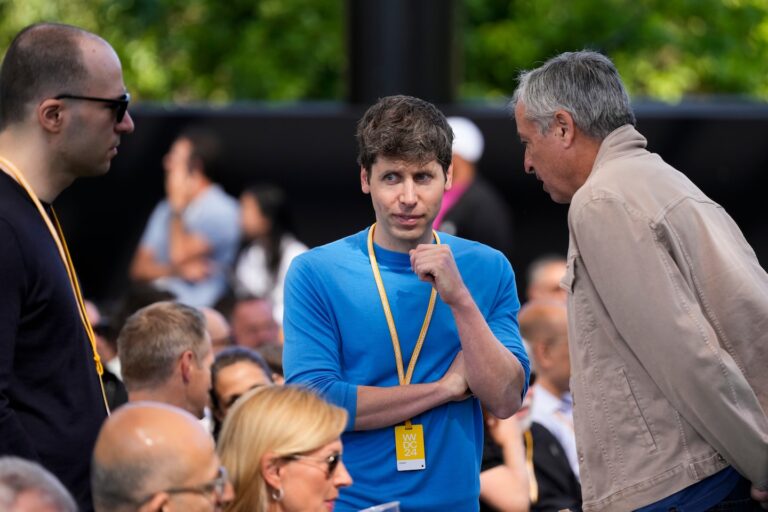Apple’s foray into AI highlights how the tech industry is betting its future on the technology. The iPhone maker has long positioned itself as forging its own path, focusing on a closed ecosystem around expensive phones and computers and touting that model as better for user privacy. But its embrace of generative AI shows that the tech trend is too powerful for Apple to ignore.
Apple CEO Tim Cook said the AI capabilities are a “game changer” and will be “essential” to future Apple products.
Apple showed off AI features it collectively dubbed “Apple Intelligence,” including text generators for emails and SMS messages, image generators that work across Apple’s apps, and a more powerful Siri voice assistant. The company touted its AI tools as better than those of competitors because they’re integrated into Apple’s software. For example, if a user asks their iPhone to “play the podcast my mom sent me,” the system automatically knows which podcast to play because it has access to the various Apple apps on the user’s phone.
Get caught up in
Summarised stories to keep you up to date
“There are some really great chat tools out there already,” Craig Federighi, Apple’s senior vice president of software engineering, said during the company’s video presentation on Monday, “but these tools know very little about users or their needs.”
Many of the tools Apple unveiled were similar to those Google has built into its rival Android operating system, such as the ability to edit photo backgrounds and remove strangers.
Apple’s deal with OpenAI could invite new scrutiny from regulators. The Cupertino, California-based company is already facing an antitrust lawsuit from the Department of Justice that accuses it of running an illegal smartphone monopoly. Antitrust enforcement agencies are wary of the way tech companies use their deep pockets to strike deals that scare away innovation. Search giant Apple’s mega-deal with Google is a key part of a government lawsuit that alleges Google is using the arrangement to squeeze out competitors.
The Justice Department and the Federal Trade Commission recently struck a deal to step up oversight of big tech partnerships, and the FTC is already investigating whether Microsoft engineered its $650 million deal with AI company Inflexion to dodge government antitrust scrutiny.
“Whether innovation runs on steam, transistors, or reconfigures human thought through machine learning, our competition enforcement principles apply,” Assistant Attorney General Jonathan Cantor said in a speech last month.
When OpenAI announced ChatGPT in November 2022, the tech world was abuzz. Microsoft, which had already partnered with OpenAI, invested billions more in the small company and began incorporating the company’s technology into its products, from its cybersecurity software to the Windows search bar. Google soon followed suit, announcing it would surface AI answers in search results and launch its own chatbot, first called Bard and then Gemini.
In interviews and company conferences last year, executives at Microsoft and Google proudly spoke about putting AI at the center of their business strategies. But Apple CEO Tim Cook was less enthusiastic. In a May 4, 2023, conference call, he told investors that generative AI still has “some problems to solve.” Apple will introduce chatbots and other generative AI technologies “very carefully,” Cook said at the time.
From chatbots churning out misinformation to image generators that repeat harmful biases against women, AI’s problems remain unsolved, but Apple is forging ahead.
“The accelerating pace of generative AI product releases is raising significant concerns for both businesses and users around safety and reliability,” said Liran Hasson, CEO and co-founder of Aporia, which makes software to help developers track AI programs and put guardrails in place. “Innovation is exciting, but the rush to release these products often comes without necessary safeguards. As we’ve seen in the past, this ‘arms race’ dynamic can lead to unintended consequences.”
In its announcement on Monday, Apple said it would run most of its AI functions on-device, in line with the privacy-focused approach it has taken to differentiate itself from Google’s Android operating system. AI functions that are too complex to run on individual phones would run in special data centers powered by Apple’s own computer chips, the company said.
According to a blog post from OpenAI, if Apple’s AI asks ChatGPT for assistance with a request, the user will be notified before the question is sent to OpenAI. Requests sent to OpenAI are not stored by the company and users’ IP addresses are “hidden,” OpenAI said.
Apple has been using AI technology for years. Image recognition algorithms help classify images in an iPhone’s photo library. AI helps the Apple Watch determine if the wearer has been in a car accident and send an alert to emergency personnel. The company’s voice assistant, Siri, was built using AI natural language processing and came before Amazon Alexa and Google Assistant.
But recent breakthroughs in AI technology have come from other companies: Google researchers authored and published papers that provide the foundation for the “large-scale language models” that power ChatGPT and other modern chatbots, which are far better able to understand and respond to human conversation than traditional voice assistants.

